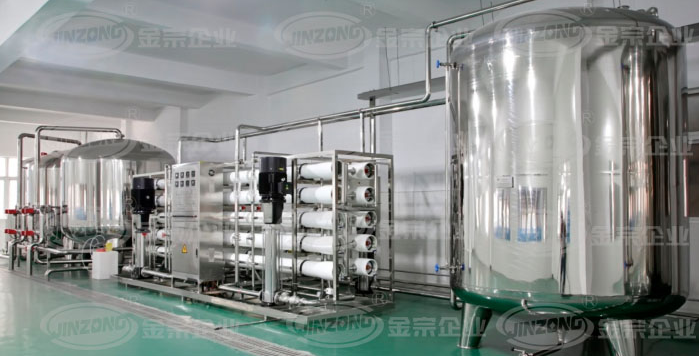Pure water refers to water that is generally sourced from urban tap water and can be filtered through multiple layers to remove harmful substances such as microorganisms. However, it also removes minerals such as fluorine, potassium, calcium, and magnesium that the human body needs.
Today, Jinzong Enterprise, with over 20 years of experience in water treatment equipment production and research and development, will share with you eight different methods of pure water equipment treatment technology.

Part1 Ozone sterilization and ultra pure water treatment
The disinfection principle of ozone (O3) is that the molecular structure of ozone is unstable at room temperature and pressure, and it quickly decomposes into oxygen (O2) and a single oxygen atom (O) on its own; The latter has strong activity and has a strong oxidizing effect on bacteria, killing them. The excess oxygen atoms will self combine to form ordinary oxygen atoms (O2), without any toxic residues, so it is called a pollution-free disinfectant. It not only has strong killing ability against various bacteria (including hepatitis virus, Escherichia coli, Pseudomonas aeruginosa, and miscellaneous bacteria), but also is effective in killing mycotoxins.
1. The sterilization mechanism and process of ozone belong to biochemical processes, which oxidize and decompose the glucose oxidase necessary for the internal oxidation of glucose in bacteria.
2. Directly interacting with bacteria and viruses, destroying their organelles and ribonucleic acids, breaking down macromolecular polymers such as DNA, RNA, proteins, lipids, and polysaccharides, disrupting the metabolic production and reproductive processes of bacteria. 3. Penetrating the cell membrane tissue, invading the cell membrane and acting on the outer membrane lipoproteins and internal lipopolysaccharides, causing cell permeability distortion and leading to cell lysis and death. And dissolve and denature the genetic genes, parasitic strains, parasitic virus particles, bacteriophages, mycoplasma, and pyrogens (bacterial viral metabolites, endotoxins) inside the dead bacteria.
Part 2 Activated Carbon Adsorption Pure Water Treatment Process
Activated carbon mainly removes organic impurities such as discoloration, odor, residual chlorine, and residual disinfectants from water through adsorption and filtration.
Part3 Membrane Microporous Filter (MF) Pure Water Treatment Process
The membrane microporous filtration method includes three forms: deep filtration, sieve filtration, and surface filtration.
Deep filtration is a matrix made of woven fibers or compressed materials, which uses adsorption or capture methods to retain particles, such as commonly used multimedia filtration or sand filtration; Deep filtration is a relatively economical method that can remove over 98% of suspended solids while protecting downstream purification units from blockage, and is therefore commonly used as pretreatment.
Surface filtration is a multi-layer structure. When the solution passes through the filter membrane, particles with larger pores inside the membrane will be left behind and mainly accumulate on the surface of the filter membrane, such as commonly used PP fiber filtration. Surface filtration can remove over 99.9% of suspended solids, so it can also be used for pretreatment or clarification.
The screen mesh filter membrane is basically a consistent structure, like a sieve, which leaves particles larger than the pore size on the surface (the pore size of this filter membrane is very precise), such as the point security filter used at the end of the ultrapure water machine; Mesh filtration and microporous filtration are generally placed at the end use point of the purification system to remove residual trace amounts of resin flakes, carbon shavings, colloids, and microorganisms.
Part 4 Ion exchange pure water treatment process
The principle of ion exchange method is to exchange inorganic salt anions and cations in water, such as calcium ions Ca2+, magnesium ions Mg2+, sulfate SO42-, nitrate NO3-, etc., with ion exchange resin to exchange the anions and cations in the water with the anions and cations in the resin, thereby purifying the water.
Part5 Reverse Osmosis (RO) Pure Water Treatment Process
It is a material separation process that uses pressure as the driving force, utilizing the selectivity of reverse osmosis membranes that can only penetrate water but not solutes, to extract pure water from water bodies containing various inorganic, organic, and microbial substances. The pore size of the reverse osmosis membrane is less than 10 angstroms (1 angstrom is equivalent to 10-10 meters), and it has a strong screening effect. Its desalination rate is as high as 99%, and the sterilization rate is greater than 99.5%. It can remove impurities such as inorganic salts, sugars, amino acids, bacteria, viruses, etc. from water. If the raw water quality and production water quality are used as benchmarks, and after appropriate design, RO is an economical and effective method for purifying tap water, and it is also a good pre-treatment method for ultra pure water systems.
Part6 Ultrafiltration (UF) pure water treatment process
Microporous films remove particles based on their filtration pore size, while ultrafiltration (UF) films act like molecular sieves, allowing solutions to pass through extremely fine pores based on size to achieve the separation of molecules of different sizes in the solution.
Ultrafiltration membrane is a strong, thin, and selective permeable membrane, with a filtration pore size of approximately 0.01 μ m. It can intercept molecules of a specific size or larger, including glia, microorganisms, and heat sources. Smaller molecules, such as water and ions, can pass through filter membranes.
Part7 Ultraviolet (UV) and ozone sterilization ultra pure water treatment process
The 254nm/185nm ultraviolet radiation emitted by ultraviolet lamps can effectively kill bacteria and degrade organic matter.
Part8 EDI pure water treatment process
A new method for treating deionized water. Also known as continuous electrostatic desalination technology, the EDI device clamps ion exchange resin between anion/cation exchange membranes to form an EDI unit. This method does not require acid or alkali to regenerate the resin, and is environmentally friendly.
Jinzong Enterprise Water Business Unit has been focusing on the production and research and development of water equipment for over 20 years, involving water supply, sewage, industrial pure water treatment process design, water treatment equipment manufacturing, etc. Welcome everyone to consult and learn more.
Click to view Jinzong's independently developed water purification equipment: https://www.jinzong.com.cn/page.html?id=472



